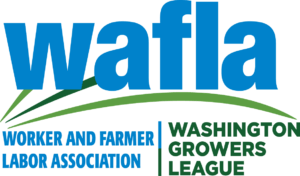Labor Department floating new wage structure for H-2A farmworkers

Labor Department floating new wage structure for H-2A farmworkers
Capital Press
Nov. 14, 2022, by George Plaven
New rules are coming to the H-2A visa program in 2023 that will likely add significant costs for farmers who rely on foreign guestworkers to harvest their crops.
That’s according to Leon Sequeira, an attorney and former U.S. assistant labor secretary. Sequeira delivered the news during a presentation Nov. 10 at the Wafla H-2A Workforce Summit in Salem.
One proposed change would alter the methodology used by the Department of Labor to calculate wages for H-2A workers.
The rule calls for breaking out certain jobs commonly done on farms, such as truck driving, construction and management, and paying them different rates assigned by the H-2B visa program for non-agricultural workers.
If a position has multiple duties, the DOL would assign the highest applicable wage.
“The bottom line is, they’re more expensive,” Sequeira told growers attending the summit at the Salem Convention Center. “If you have trucking work on your farm, you could be looking at, in some cases, double the wage rate compared to now.”
If implemented, Sequeira said the higher rates would be an “unmitigated disaster” for producers facing steep labor and input prices. As it stands, Oregon and Washington already pay the second-highest wages for H-2A workers nationwide, behind only California.
Minimum wages for H-2A workers, known as the “Adverse Effect Wage Rate,” or AEWR, are calculated annually by region based on the USDA’s Farm Labor Survey. This approach was created to keep wages for foreign workers high enough that they don’t displace domestic workers.
But data shows farms are increasingly relying on these workers to fill the widening labor shortage at home.
The number of H-2A visas issued by states has risen each year since 2012, reaching 257,898 in 2021. Florida issued the most visas, with 44,706, followed by Georgia with 35,205, California with 32,333, and Washington with 24,862.
Wafla, based in Lacey, Wash., is the fourth-largest single employer of seasonal H-2A farmworkers. Members include farms across the Pacific Northwest.
Oregon and Washington had an AEWR of $17.41 per hour in 2022, up 6.5% over the previous year. California’s AEWR led all regions at $17.51 per hour.
By comparison, farms in southern states paid far less for H-2A guestworkers. The lowest rate was $11.99 per hour in Alabama, Georgia and South Carolina, and $12.41 in Florida.
“If you’re a specialty crop producer, this is the number one cost driver for you — labor,” Sequeira said.
The result, he added, has been predictable. U.S. fruit and vegetable growers have experienced a net trade deficit for the last 15 years as the country buys more produce that can be more cheaply grown in countries like Mexico.
“It’s a massive public policy failure,” Sequeira said. “I have no answer for where this is going, other than up. We’re going to buy more of our food from abroad. The government is going to price U.S. farmers out of business. There’s just no way around it.”
A final rule on H-2A wage rates is not expected until next year.
Meanwhile, lawmakers have attempted to address the farm labor problem in recent years with the Farm Workforce Modernization Act, which twice passed the House in 2019 and 2021 but lacks any Republican support in the Senate.
Sequeira said the bill would provide no meaningful relief for H-2A. Instead, it offers a path to citizenship for foreign workers currently in the country illegally.
Workers who gain citizenship may decide to leave agriculture, worsening the industry’s labor shortage, Sequeira said. The bill would also make E-Verify mandatory solely for farmers, further limiting the domestic labor pool and driving up demand for H-2A.
“We still need workers in agriculture because somebody needs to harvest the crops,” he said. “This bill seems oblivious to that fact.”
With a divided Congress following the 2022 midterm elections, Sequeira said it’s possible there could be a “Grand Bargain” in the offering for H-2A reforms, though House Republicans will focus on border security first.
